<> Euripus nyctelius (Doubleday, 1845) <>
the Courtesan ผีเสื้อปีกเว้าธรรมดา
Click on any photo to see all photos full size in Lightbox
Additions and corrections to the information provided on this page is always welcome. Please use the Contact form.
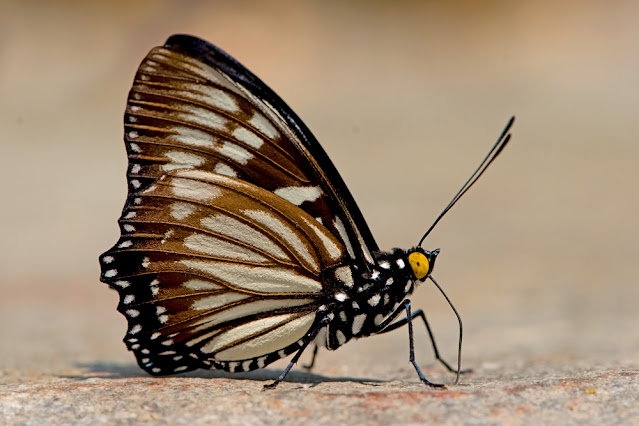
Photo taken at Doi Suthep-Pui National Park, Chiang Mai, Thailand ♂ 700m a.s.l.

Euripus nyctelius is a widespread species found across most of the region but is not common. It is dimorphic and there are differences between sexes in both size and appearance. The male is most often seen and can be instantly recognised by its distinctive yellow eyes while the female is polymorphic and has several different forms plus innumerable unnamed intermediate forms. These female forms mimic the distasteful Euploea species of the family Danainae.
Males are smaller than the females but are very territorial and strong fliers. Euripus nyctelius is multivoltine and there are several generations per year. The adult female lays her eggs singly on the upperside of a leaf on the host plant. The newly hatched larva eats the egg shell as its first meal. There is recent evidence that shows this species is slowly spreading northwards.
Synonyms and previously used names: Euripus halitherses, Euripus haliartus, Hestina isa, Euripus cinnamomeus, Euripus mastor, Idrusia nyctelius, Euripus badria, Euripus neda, Euripus phygalia, Diadema nyctelius
Taxonomy: Animalia - Arthropoda - Insecta - Lepidoptera - Nymphalidae - Apaturinae - Euripus - nyctelius
Regional subspecies: E.n.eupleoides (S.Thailand, Malaysia, Singapore), E.n.nyctelius
(India, Myanmar, Thailand, Laos, Vietnam, China). There are also a
number of different subspecies amongst the islands in both Indonesia and
the Philippines and further taxonomic study is probably needed.
Regional Distribution: India, Bhutan, Bangladesh, Myanmar, Thailand, Laos, Cambodia, Vietnam, China, Malaysia, Singapore, Indonesia, Philippines
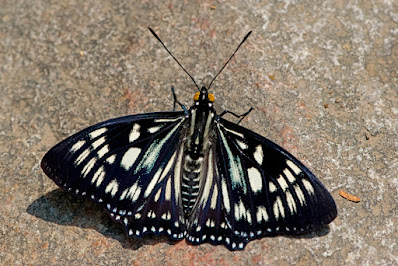 |
Doi Suthep-Pui National Park, Chiang Mai, Thailand ♂ 700m a.s.l. |
Habitat: Euripus nyctelius is found in a variety of habitats including primary rainforest, evergreen and deciduous montane forest, wasteland, and anywhere there is secondary vegetation. Elevations tend to be at moderate levels up to 1600m a.s.l.
Flight time: all year depending on location Wingspan: 50-70mm
Life History: egg 3-4 days instar 1 3-4 days instar 2 3 days instar 3 3 days instar 4 4 days instar 5 5-7 days pupa 6-7 days Total egg to adult 27-31 days. All times approximate.
Larval Hosts: Trema orientale, Trema cannabina, Trema tomentosum (Cannabaceae), Albizia chinensis (Fabaceae). Actual host plant used depends upon location and availabilty of plant species.
Adult Food Sources: Nectar - Mikania micrantha (Asteraceae), Zanthoxylum avicennae (Rutaceae), Persicaria perfoliata (Polygonaceae). Other - mud puddling, animal dung.
NOTE: there have been few studies of this sometimes rare and elusive species and it is likely that there are further host and nectar plants that are utilized and not yet recorded.
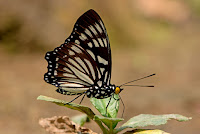 |
| Lamnamkok National Park, Chiang Rai, Thailand ♂ |
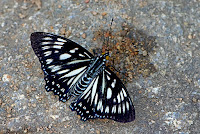 |
| Lamnamkok National Park, Chiang Rai, Thailand ♂ |
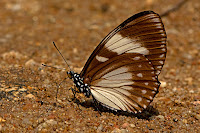 |
| Lamnamkok NP, Chiang Rai, Thailand ♀ form euploeoides |
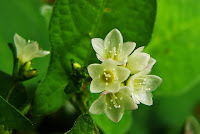 |
| Persicaria perfoliata, a nectar source |
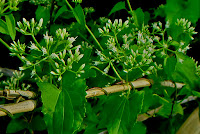 |
| Mikania micrantha, another nectar source |
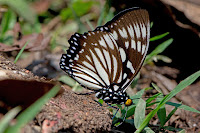 |
| Doi Suthep-Pui National Park, Chiang Mai, Thailand ♂ |
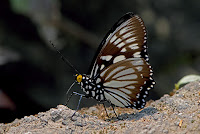 |
| Doi Suthep-Pui National Park, Chiang Mai, Thailand ♂ |
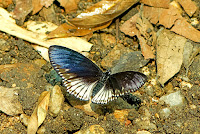 |
| Doi Suthep-Pui NP, Chiang Mai, Thailand (unnamed ♀ form) |
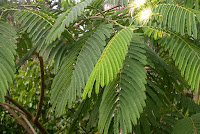 |
| Albizia chinensis, a larval host |
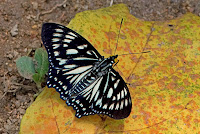 |
| Lamnamkok National Park, Chiang Rai, Thailand ♂ |
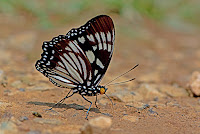 |
| Chiang Dao Nature Sanctuary, Chiang Mai, Thailand ♂ |
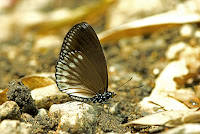 |
| Doi Suthep-Pui NP, Chiang Mai, Thailand (unnamed ♀ form) |
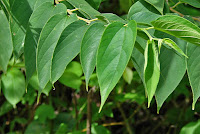 |
| Trema orientale, another larval host |
Links to other pages in this series for species in the same subfamily
